- Home
- Nathan Lowell
Home Run Page 14
Home Run Read online
Page 14
“Not sure what he can do, but it was a good idea,” Natalya said.
“Speaking of neighbors, you’ll never guess who I met over there, Natty.”
“Who? Wait.” Natalya blinked a couple of times. “What did you call me?”
“Natty.”
“No.”
“Yes.”
“You saw my father? Where is he? Is he with you?” She pushed past Zoya and into the cockpit.
“He skipped out while my back was turned. I didn’t have time to get the shackles on him.”
Natalya stared at Zoya. “Spill.”
“We had a nice chat the second day I was there. He seemed upset that somebody other than his daughter was flying the ship.”
“Oh, gods. You didn’t hurt him, did you?”
“Calm down. Nobody hurt anybody.” She smiled at Natalya. “You have his eyes. Anyway, he said you should use a bigger hammer.”
“A bigger hammer?”
Zoya shrugged. “That’s what he said. He looked at the pilot’s console and said I should tell you to use a bigger hammer.”
Natalya frowned. “There’s a message there but I can’t find it.”
“It’ll come to you. Tell me what’s going on here.”
“Not much. I’ve been poking around. Found a shuttle in bay five.”
“Operational?” Zoya asked.
“Not at the moment, but I think I know what the problem is. Now you’re back with my toolbox, I can probably repair it. Bean has been designing like a fiend but I think it’s more to keep busy than anything else. He keeps muttering about design parameters and end goals.”
“We have some now.”
Natalya’s eyebrows rose. “We do?”
“When I realized that this is a honey trap, a lot of the noise cleared up. My grandmother wants me to take over this operation. I suspect it was always the operation she had in mind for me. It’s just a little different from what she intended. She knows I can’t walk away and leave these people to cope by themselves.”
“That seems kind of cold.”
Zoya thought about that for a moment. “I suppose, but I’ll bet you credits to crullers that we’ll have some kind of shipment hit here in about three weeks. They’ll probably send some logistical stuff. Food. Air. Probably scrubber cartridges for the miners and haulers. It’ll be a nice cushion but we should have that handled by then. I’ve got a printer and feedstock stashed in your stateroom. We’ll have power and environmental for about a couple of dozen people very soon ... if we don’t already.”
Natalya blinked. “We will?”
“We still need deep-space construction workers. They won’t be cheap but we’ve got some metals and ores to sell as soon as we can figure out how to get them to market.”
“Back up. Where are we going to find bunks?”
“The Mindanao. It’s still there according to short range. It’s shifted position relative to the yard, but it’s still there.”
“We’re going to storm them with wrenches and our good looks?”
“As stunning as we are, I think we’ll leave that to the pros.”
“The pros?”
Zoya shrugged. “Rock Ripper still out there?”
“Yeah, he moved a bit closer to the yard and there are a couple more barges inbound.”
“Good. We need to get him unloaded.”
“How?”
“I intend to ask him. He’s the closest barge and the sooner we get him back out there, the sooner we’ll have fresh water. There’s apparently water ice somewhere in the belts. If Ripper doesn’t know where, I bet somebody out there knows which belt and approximately where. We need to find it.”
“We can’t use it raw,” Natalya said.
“I didn’t expect so but it’s a start, and getting a filtration plant up is going to be important. The Peregrine has nearly full tanks again, courtesy of Lumineux. In three weeks, we’re going to have a tractor at our disposal.” Zoya paused. “At least I hope so.”
“How are you going to convince that captain to work for you?”
“I’m going to hire him.”
“What with?”
“A can of metal,” Zoya said. “But we need to figure out how to unload it. Let’s go talk to Kim. How’s she doing?” Zoya headed for the lock.
“Better, I think. Having us here seems to have helped.”
“You still sleeping on the deck?”
Natalya made a face. “Yeah.”
“Well there’s two bunks and two couches here, and we’ll have the Mindanao’s berthing area soon.”
Natalya looked sideways at Zoya. “You keep saying that.”
Zoya shrugged and kept walking toward the lock.
They found Bean at a desk in the main room, one of his toolboxes open beside it with a large flat display standing up on it and a digital drafting table hanging off the side.
“How’s it going?” Zoya asked.
He shrugged without looking up. “Slow. I’m trying to figure out how to stage the build but I keep stumbling on the sequencing and how to connect everything.”
“Start from the final goal and work back,” Zoya said.
He looked up then. “Do we have a final goal? When you left we were still looking at starting with the grinder and adding a smelter.”
“We’re going full vertical. Ore in, alloy out. Start with a mid-range alloy setup. Work backwards from there until you have the station laid out, then sequence the build starting with the grinders and working forward.”
His eyes went absolutely round. “That will take stanyers.”
“We have a few months. Make it happen.”
His mouth opened a bit and his brow furrowed. “What’re you thinking about for alloy capacity?”
“What’s the output on the alloying forge in Margary?”
“I don’t know. Something like five metric kilotons a week. It all goes to Manchester.”
“Too small,” Zoya said. “How do we get to ten?”
“Build capacity in stages,” Bean said. “Design each stage as a module we can build and plug in as we go.”
“Downside?” Zoya asked.
“Connecting them.”
“Design a connector module,” Natalya said.
Zoya grinned. “I like that.”
Bean nodded. “I can see that. Rather than trying to plug modules into each other, create a standard connection channel. We’d need different ones between each kind of process, but yeah.”
“Why isn’t that being done now?” Zoya asked.
“Cost,” Bean said. “Almost every one of our facilities is built for least cost.”
“Which locks them into a fixed capacity,” Zoya said.
“By and large, true,” Bean said.
“What’s being transferred from process to process?” Natalya asked. “I don’t know how this all works.”
Bean turned to his drafting table, opened a new sheet, and started to sketch. “Raw mats come in here. That’s ore. We generally use a gravity plate in the bottom of a hopper assembly to pull the ore out of the haulers and into the system. It gets moved to a storage bunker for the grinders.” He sketched in the idea with boxes and arrows. “We’ve been using old-school belts and buckets to move it to the hoppers at the top of the grinders. The grinders break up the raw ore into uniform chunks.” He sketched it in as he spoke.
“Why break it up?” Natalya asked.
“Uniform chunks all melt at about the same rate,” Zoya said. “What if we just used gravity?”
Bean looked up. “To melt it?”
“To move it,” Zoya said. “Put the bunkers under the ore hoppers. Put the grinders under the bunkers.”
He blinked a couple of times and turned to his table again. With a flick of his stylus he pulled up a new page. “Like this?” He drew a rough hopper shape with an oblong below it. He scribbled “BUNKER” on the box before adding another oblong below that. He scribbled “GRINDER” on that box and sat back.
Natal
ya said. “How do you expand it?”
“Another stack beside it,” Bean said.
Zoya nodded. “We need the ore sorters. That usually happens between grinding and smelting.”
Bean nodded. “It does but I think that’s missing a bet.”
“Tell me,” Zoya said.
“One of the things I noticed at Grinder Eight. Barges tended to bring in ore that was predominantly one mineral. There might be traces of others but a chunk of rock is largely iron or lead. Tin or manganese. I’m pulling these examples out of the sky, but you get the idea.”
“Go on,” Zoya said.
“Historically we assay the smaller bits after they come out of the grinder. That’s a lot of testing. It goes fast, but what if we just told the skippers to pick rocks that are predominantly, say, lead and harvest a whole load of lead ore?”
“Do they know what’s in the rock before they harvest?” Natalya asked.
“Yeah,” Zoya said, frowning. “They do. Survey teams work through the belts to map where the various minerals concentrate. Most rocks are just basic rock. We don’t harvest those.”
“Is this whole system surveyed already?” Natalya asked.
Zoya shook her head. “UM has a couple of jump-capable survey vessels that visit our sites periodically to map new sections for exploitation.” She looked at Bean. “That will reduce our production of rare-earth byproducts, won’t it?”
“Not necessarily. The rare-earth byproducts aren’t really all that rare. They don’t show up as traces but as prime rocks in their own right. Something about the various fracture indexes tends to make the rocks relatively uniform in terms of mineral distribution.”
“So a rock will be mainly one mineral in a matrix of stone?” Natalya asked.
“Exactly,” he said. “A barge could harvest an iron rock and almost all the usable ore in that will be some kind of iron oxide. Or take a rock that assayed for a lanthanide like ytterbium. Most of the metal in that rock is going to be ytterbium. The percentage of metal to rock is going to be much lower than, say, a nickel-iron rock but whatever metal is there is going to be mostly ytterbium.”
“So there’ll be more waste but sorting it by assay type to begin with will be a time saver,” Zoya said.
“Exactly,” he said again. “We didn’t ever get much product on the rare earths coming out of the grinder, but I suspect that it’s because the survey teams set too low a threshold for the assay.”
The idea swept through Zoya’s brain. “So we may have rocks out there getting passed over because the surveys didn’t see the metal in the rock?”
“Or didn’t see a tiny assay on ytterbium as significant when it’s the only metal present,” Bean said.
“Does that affect the processing costs?” Natalya asked.
“Slightly but the market demand for those keeps the price up,” Zoya said.
“There’s another factor,” Bean said. “Most of the rocks are bigger than a barge can mine. Telling the skippers to focus on a single ore-type won’t be that much of a shift in the way they’re doing business already.”
Zoya nodded. “True. We might leave a lot of little rocks or half-mined ones, but I’d guess the skippers are doing that anyway.”
Bean shrugged. “I’ve never gone out but I had a lot of time to kill between jobs on that grinder platform. The data seemed pretty conclusive.”
“Run me up a rough sketch of a processing stack,” Zoya said. “Haulers run a hundred and fifty metric kilotons. Use that as your baseline starting point for your first bunker. We want to process that entire bunker in two weeks.”
“Maybe put a bunker between each step where you’re storing solids?” Natalya asked.
“The actual smelting process needs to change,” Zoya said. “If we’re going to make steel, we’re going to need carbon.”
“I can make a carbon line,” Bean said. “It’s basically just a grinder. What about power?”
“What about it?” Zoya asked.
“Well, how modular do you want this to be? Each block should have its own power, or each stack?”
Zoya pursed her lips. “Some of those stacks are going to need a lot of power.”
He nodded. “There’s a certain elegance to giving each block a dedicated power supply, but then each one would require its own maintenance.”
Natalya nodded. “That’s a lot of maintenance. What if all the blocks had power connections heavy enough for the biggest load and all the connections are in standard locations?”
Bean nodded. “Build a basic power block that can plug into the stack and just vary the size of the fusactor?”
“That’s what I was thinking,” Natalya said, looking at Zoya.
Zoya nodded. “I like it. Why isn’t my grandmother doing that?”
“Least-cost rules,” Bean said. “This is not least-cost construction.”
“No, but least cost is also short-term thinking. The only thing that changes by doing it this way is that the break-even point gets pushed out,” Zoya said. She nodded at Bean. “Rough it out for an iron production line starting at the ore hopper and ending with extruded iron bars. We can use that as a baseline and mod it up for variations from there.”
He saluted with his stylus and turned to his drafting table.
Chapter 28
Smelter Seventeen:
2368, February 12
Natalya watched Zoya with new eyes. Something happened at Port Lumineux but Natalya didn’t know what. “So, how’s this going to work with the Mindanao?” Natalya asked as they walked away from Bean.
Zoya grinned. “Honestly, I don’t know. I’m not completely certain that it will.”
“Shall we adjourn to the ship? Maybe have some coffee while you fill me in on it?”
“Where’s Kim?” Zoya asked.
“Upstairs, I think. Why?”
“We need to see her about the cargo handlers.” Zoya headed for the stairwell with Natalya on her heels.
“I thought her whole crew died,” Natalya said.
“Yes, but there are extra grappling rigs in the first bay.”
“Oh,” Natalya said. “I’m with you now.”
Ahokas turned to look at them as they crested the landing. She had been looking out the armorglass in the direction where the station had been. “Sorry,” she said. “I’m just wool-gathering.” She shook her head as if to clear her mind. “Do we have a plan?”
“Yes,” Zoya said. “But we need your help.”
The woman brightened visibly, her back straightened, and she stood a little taller. “What can I do?”
“The rigs you use to move the cans around. There are some in the first dock. Are they functional?”
“You mean, can we use them to move a can?” She nodded. “Sure, but we don’t have operators.” She swallowed hard and kept her composure.
“Do you know how to run them? How hard is it to learn?”
“Of course,” she said. “I worked up from laborer. It’s a requirement for this job.”
“Good,” Zoya said. “We need you to teach us.”
“Us who?” Ahokas said. “You two?”
“We’re already familiar with operating vehicles in zero-gee,” Zoya said. “Why not us?”
“It takes more than two to move a full can.”
“Could the three of us to it?” Zoya asked.
Ahokas paused, a hand to her mouth. “Possibly, if we took it slow. Once they get moving, they’re going to be tough to stop.”
“Yeah, I can see that,” Zoya said.
“We still need to figure out how to fill and empty them,” Natalya said.
“That’s easy. The cargo handling equipment and warehousing is below.” Ahokas said.
“So we can empty and fill cans here?” Zoya asked.
Ahokas nodded, somewhat uncertainly, but she nodded. “It’s what we do. We’ve got some warehousing space free, but we’re going to top off pretty fast with no place to send it.”
“Perfect. Thank
you,” Zoya said as she headed for the common room again.
Natalya leaned in to her on the way back down the stairs. “We need to find something for her to do.”
Zoya nodded. “I know, but if things go the way I think they’re going, she’ll have plenty to do soon. Right now we have a crew of four. Counting you and me. How are the stores holding up, by the way?”
“There wasn’t that much here to begin with,” Natalya said. “We don’t eat much so that case of meals we brought over from the Peregrine before you left is still pretty full. We’ve got weeks of food for the four of us, and we can always jump over to Lumineux.”
Zoya chuckled. “Yeah. About that. Lumineux isn’t exactly what you’d expect from a Toe-Hold.”
“I’ve been trying to get you to fill me in on that. You keep ducking the question.”
“Let’s go find that coffee pot now, shall we?” Zoya said.
Zoya picked up her pace and Natalya lengthened her stride to keep up.
“You seem different, Zee.”
“Different? How?”
“We’ve been together for a very long time.”
Zoya smiled. “You thinking you want to trade me for a newer model?”
“Not at all. It’s just that you’ve come back from Lumineux with—I don’t know—more determination.”
“This whole situation has pissed me off, Nats.” Zoya sighed. “How many people died here? Either from a fusactor tragedy or a bomb.”
“A bomb?”
“Something blew. It just happened to be near the fusactor but according to Kim, it was also really near the can.”
“Yeah?”
“The Mindanao is still out there, isn’t she?”
“Yeah. I think so.”
“We should check.” Zoya keyed the lock open and headed for the galley. “I’ll make the coffee. You check on our friends.”
Natalya dropped into the familiar couch and brought up the displays. “Yeah. Still there. Pretty much where we saw them last.”
“Figured,” Zoya said, coming out of the galley and leaning on the bulkhead. “What’s their range?”

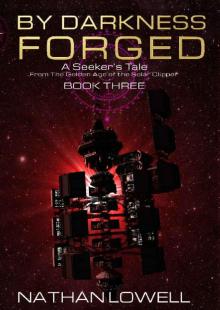 By Darkness Forged (Seeker's Tales from the Golden Age of the Solar Clipper Book 3)
By Darkness Forged (Seeker's Tales from the Golden Age of the Solar Clipper Book 3) The Wizard's Butler
The Wizard's Butler Cape Grace
Cape Grace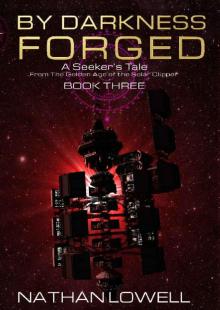 By Darkness Forged
By Darkness Forged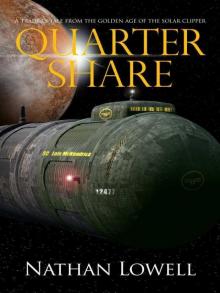 Quarter Share
Quarter Share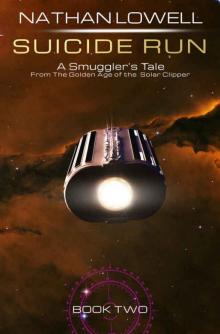 Suicide Run (Smuggler's Tales From the Golden Age of the Solar Clipper Book 2)
Suicide Run (Smuggler's Tales From the Golden Age of the Solar Clipper Book 2)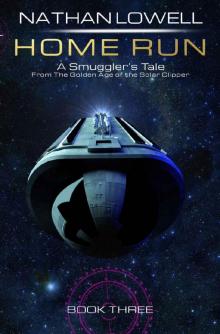 Home Run (Smuggler's Tales From the Golden Age of the Solar Clipper Book 3)
Home Run (Smuggler's Tales From the Golden Age of the Solar Clipper Book 3)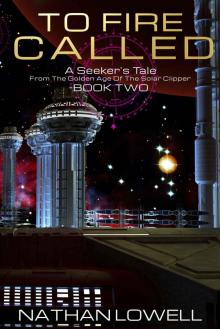 To Fire Called (A Seeker's Tale From The Golden Age Of The Solar Clipper Book 2)
To Fire Called (A Seeker's Tale From The Golden Age Of The Solar Clipper Book 2)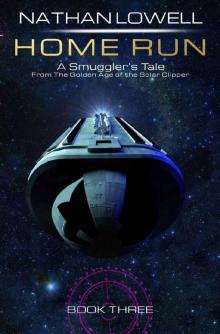 Home Run
Home Run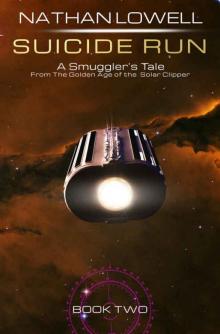 Suicide Run
Suicide Run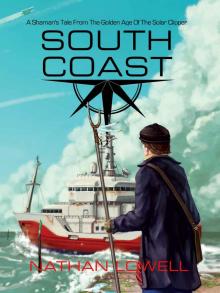 South Coast (Shaman's Tales From The Golden Age Of The Solar Clipper Book 1)
South Coast (Shaman's Tales From The Golden Age Of The Solar Clipper Book 1)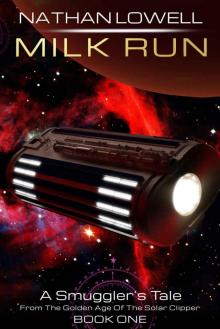 Milk Run (Smuggler's Tales From The Golden Age Of The Solar Clipper Book 1)
Milk Run (Smuggler's Tales From The Golden Age Of The Solar Clipper Book 1) Ravenwood (Tanyth Fairport Adventures)
Ravenwood (Tanyth Fairport Adventures)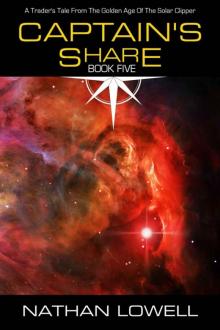 Captain's Share (Trader's Tales from the Golden Age of the Solar Clipper)
Captain's Share (Trader's Tales from the Golden Age of the Solar Clipper) Owner's Share (Trader's Tales from the Golden Age of the Solar Clipper)
Owner's Share (Trader's Tales from the Golden Age of the Solar Clipper)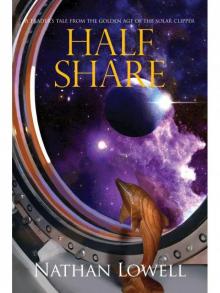 Half Share
Half Share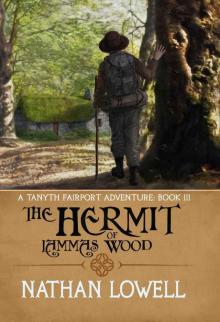 The Hermit of Lammas Wood
The Hermit of Lammas Wood Ravenwood
Ravenwood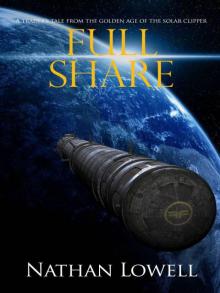 Full Share
Full Share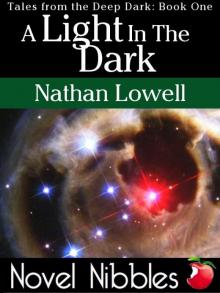 A Light In The Dark (Tales of the Deep Dark)
A Light In The Dark (Tales of the Deep Dark)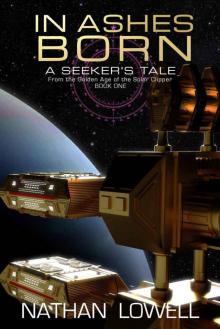 In Ashes Born (A Seeker's Tale From The Golden Age Of The Solar Clipper Book 1)
In Ashes Born (A Seeker's Tale From The Golden Age Of The Solar Clipper Book 1)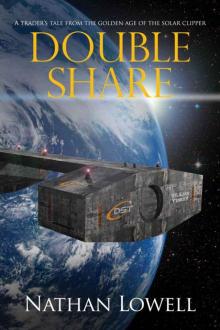 Double Share: Solar Clipper Trader Tales
Double Share: Solar Clipper Trader Tales Zypheria's Call (A Tanyth Fairport Adventure)
Zypheria's Call (A Tanyth Fairport Adventure)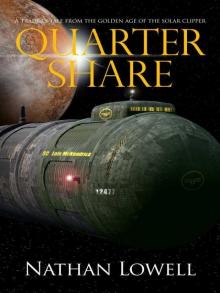 Quarter Share attftgaotsc-1
Quarter Share attftgaotsc-1